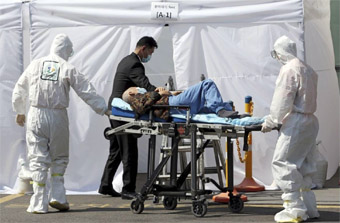
Central Bank Seeks to Calm
South Korean Markets
| published June 11, 2015 |
By Keith H. Roberts
Thursday Review contributor
Amid concerns that its economy is slowing to a standstill and that fears over a deadly outbreak of the MERS virus might trigger a deep recession, South Korea’s central bank has taken the extreme but calculated step of cutting its interest rates to the lowest level in that country’s history.
The bank and its economists hope to avert the financial and market disaster of recession as South Koreans fail to show up for work and avoid shopping even for essentials. As recently as last week there were indications that the economy was in a sharp contraction, the result, polls indicate, of Koreans fearful of contact with other residents of South Korea. Some businesses were already limiting access, and as of this week thousands of schools and kindergartens were closed.
The government bank also lowered expectations for output and growth for the current quarter. South Korea’s economy and trade balance was already suffering as competition stiffens between China and Japan for many of the same non-Asian markets. The current MERS outbreak has also stymied tourism as thousands of travelers have cancelled flights and hotel reservations and as theme parks and restaurants have shut down.
The MERS virus (Middle Eastern Respiratory Syndrome) has already been responsible for at least 10 deaths and hundreds of illnesses in South Korea. MERS was introduced into South Korea in May after a businessman returned from a trip to several Middle Eastern countries. According to Seoul, U.S. reports, and World Health Organization information, roughly 3,800 people are being held in isolation, many of them individuals who came in contact with the infected people.
MERS can spread very rapidly, cause serious illness—including high fever, and respiratory and kidney failure—and has a mortality rate of more than 40%. At the onset its symptoms are similar to a common cold or mild flu, but it can rapidly develop into the more serious and deadly condition. Almost all of South Korea’s MERS patients are be treated in special units in modern hospitals, and WHO representatives say that there is no immediate danger to the general population. Epidemiologists believe that MERS is spread through respiratory fluids exchanged in close contact, such as coughing or sneezing. It is rarely spread through other forms of routine contact, such as surfaces.
Health officials in South Korea say that they are hopeful the outbreak has peaked and that by isolating those 3,800 people has staved off a wider epidemic. Officials with WHO and the U.S. CDC say that within about one week, the number of new cases may decline or come to a stop, meaning that medical authorities have halted the spread of the disease.
Related Thursday Review articles:
Safest City in the World: Tokyo; Thursday Review staff; Thursday Review; March 13, 2015.
